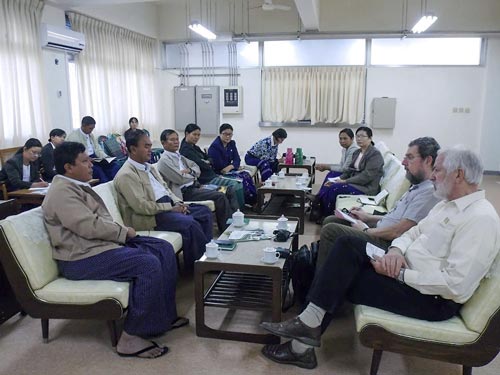Blogs
Researchers define and measure “sustainability”
 Capacity development
Capacity development
Leading specialists on the sustainable intensification of agriculture tried to hammer out indicators for assessing “sustainability,” a development term that refers roughly to the health and longevity of a system, at a 13 February workshop in San Jose, California.
Men’s roles and attitudes are key to gender progress, says CIMMYT gender specialist
 Gender equality, youth and social inclusion
Gender equality, youth and social inclusion
Gender research and outreach should engage men more effectively, according to Paula Kantor, CIMMYT gender and development specialist who is leading an ambitious new project to empower and improve the livelihoods of women, men and youth in wheat-based systems of Afghanistan, Ethiopia and Pakistan.
Presidential award in recognition of critical breakthrough in maize breeding in Zimbabwe
 Climate adaptation and mitigation
Climate adaptation and mitigation
The Zimbabwe Maize Breeding Programme was honored on 13 February 2015, as the 2014/2015 Presidential Award winners in agricultural research during a ceremony attended by more than 1,500 people at the Research Council of Zimbabwe’s 10th International Research Symposium held in Harare.
Maize and wheat Super Women campaign highlights diversity
 Gender equality, youth and social inclusion
Gender equality, youth and social inclusion
A social media campaign initiated to celebrate the achievements of women has led to more than a dozen published blog story contributions about women in the maize and wheat sectors.
No scientific basis for criticism of wheat as a food staple, nutritionist says
 Nutrition, health and food security
Nutrition, health and food security
A nutritionist wants to dispel myths generated by claims that the protein found in wheat is unhealthy.
Opportunity: integrating gender in crop research today!
 Gender equality, youth and social inclusion
Gender equality, youth and social inclusion
CIMMYT Gender Specialist Lone Badstue attended a CGIAR Gender Network meeting in the Philippines during 19-23 January. Participants discussed CGIAR’s progress and results in gender research, along with plans for collective, cross-program activities that contribute to CGIAR innovation.
USAID’s Feed the Future initiative highlights CIMMYT heat tolerant maize breeding
 Climate adaptation and mitigation
Climate adaptation and mitigation
The Feed the Future initiative of the U.S. Agency for International Development (USAID) featured CIMMYT’s Heat Tolerant Maize for Asia (HTMA) project in a recent newsletter, highlighting it as an exemplary public-private partnership. Launched in 2013, the project is developing heat-resilient hybrid maize for resource-poor smallholder farmers in South Asia whose livelihoods are threatened by climate change.
Extension bulletins raise awareness of conservation agriculture in Malawi
 Innovations
Innovations
CIMMYT, Washington State University and Total Land Care (TLC) recently published a series of extension bulletins to spread awareness of the potential benefits of conservation agriculture (CA) techniques for farmers in Malawi.
Prioritize food security, not conflict, wheat scientist advises
 Climate adaptation and mitigation
Climate adaptation and mitigation
Heat and drought are a major cause of wheat yield losses worldwide, problems that scientists predict will worsen due to climate change.
DTMA launches new project to improve seed scaling in Eastern Africa
 Climate adaptation and mitigation
Climate adaptation and mitigation
Born out of the Drought Tolerant Maize for Africa (DTMA) Initiative and other CIMMYT-Africa maize projects, the Drought Tolerant Maize for Africa Seed Scaling (DTMASS) project will improve the demand for and availability of high-quality, affordable, certified seed of drought-tolerant maize varieties for small-scale farmers across eastern and southern Africa.
Chief Minister of Bihar assures support to BISA
 Climate adaptation and mitigation
Climate adaptation and mitigation
The Chief Minister of Bihar, India, Shri Jitan Ram Manjhi, affirmed his support for the Borlaug Institute for South Asia (BISA) and its efforts to ensure food security, in a meeting with Thomas A. Lumpkin, director general of CIMMYT, and with government, BISA and CIMMYT representatives on 3 February.
Crop model gives scientists a window on future farming in the Eastern Gangetic Plains
 Capacity development
Capacity development
In work to help farmers in South Asia tackle changing climates and markets through resilient and productive cropping systems, scientists are now using a leading and longstanding model, the Agricultural Production System Simulator (APSIM).
Spreading innovation: new partnerships drive change in Odisha
 Capacity development
Capacity development
The Cereal Systems Initiative for South Asia (CSISA) has collaborated with Digital Green (DG), the Department of Agriculture (DOA), Government of Odisha, Krishi Vigyan Kendras (KVKs) and Orissa University of Agriculture & Technology (OUAT) for a pilot project integrating information and communication technology (ICT)-based video-led dissemination models in 20 villages of Puri district in Odisha, India.
Myanmar and CIMMYT assess needs and joint maize and wheat research
 Innovations
Innovations
Officials of Myanmar’s Ministry of Agriculture and Irrigation and CIMMYT representatives met to strengthen collaboration, with a focus on increasing farm productivity and training a new generation of Myanmar scientists.

